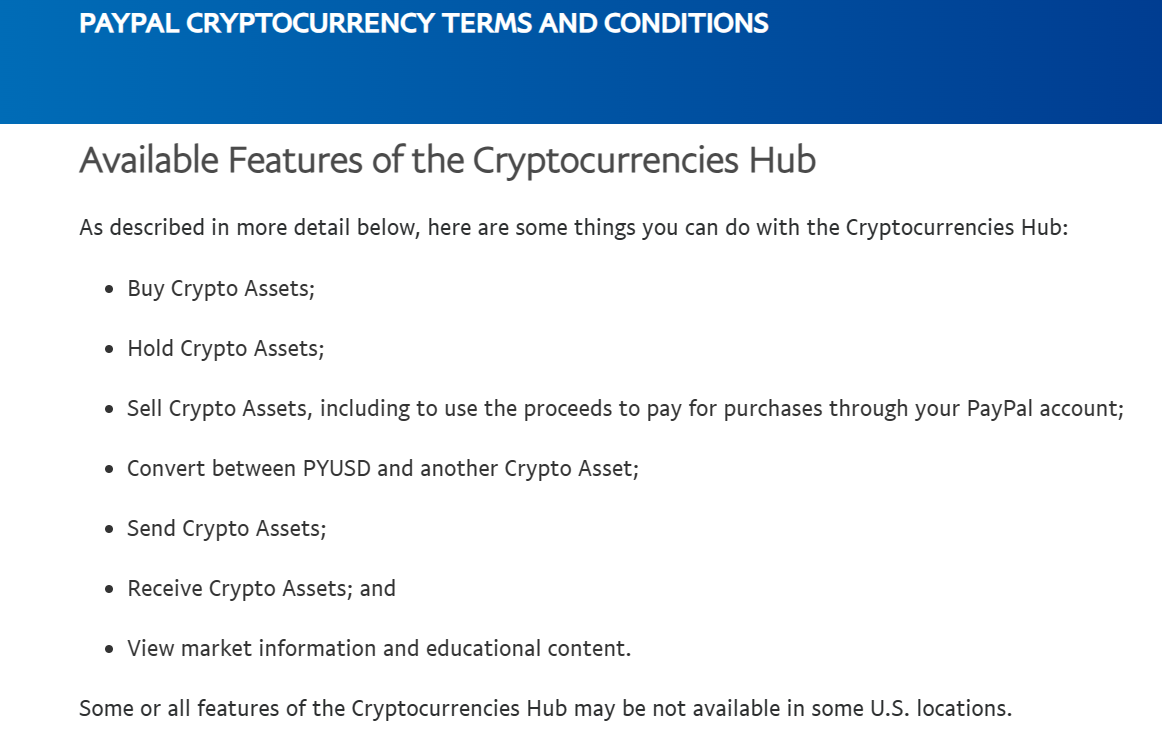The latest PayPal terms and conditions detail the prerequisites for crypto users interested in using the platform for cryptocurrencies. The Cryptocurrencies Hub is key for PayPal to reinvent itself as a crypto-inclusive platform. According to the company, the service will allow for the sale and purchase of cryptocurrencies. In addition, it will facilitate the payment for purchases via PayPal using the money stored after the sale of cryptocurrencies.

PayPal Cryptocurrenies Hub as explained in terms and conditions. Source: PayPal
The Cryptocurrencies Hub will also be crucial to convert between PYUSD and other crypto assets. PayPal further clarified:
“Any balance in your Cryptocurrencies Hub represents your ownership of the amount of each Crypto Asset shown. You will not hold the digital Crypto Assets themselves in your Crypto Asset balance.”
However, not all PayPal users will get to explore the new feature as the company will decide its access from person to person. For starters, to be eligible for Cryptocurrencies Hub, a PayPal user must have “a personal PayPal account and a Balance Account in good standing.” In addition, PayPal will also verify the required identifying information — which includes name, physical address, date of birth, and taxpayer identification number — provided by the users:
“You can only use your Cryptocurrencies Hub as part of your Balance Account by accessing it through your personal PayPal account. If you are a Hawaii resident, we will not allow you to establish a Cryptocurrencies Hub at this time.”
Upon rollout of the feature, Cryptocurrencies Hub will be directly linked to the users’ PayPal account and can be accessed using the existing credentials.
Related: PayPal’s crypto holdings increased by 56% in Q1 2023 to nearly $1B
The launch of PayPal USD divided the crypto community as contradicting speculations around its impact on crypto took center stage.
This is the Ethereum contract address for PayPal's stablecoin.
I can't believe i get to tweet that.
We've come so far. pic.twitter.com/S6kSqcV4ut
— RYAN SEAN ADAMS - rsa.eth (@RyanSAdams) August 7, 2023
While many envision PYUSD to fast-track Ether’s (ETH) mainstream adoption, it could also spell trouble for decentralization and personal control of assets, warns the community. Several smart contract auditors highlighted that PYUSD’s smart contract contains “freezefunds” and “wipefrozenfunds” functions, which they claim are textbook examples of centralization attack vectors in Solidity contracts.
Cryptocurrency exchanges review:
#1 OKX - 24h Volume: $ 1 097 255 972.
OKX is an Hong Kong-based company founded in 2017 by Star Xu. Not available to users in the United States.
#2 ByBit - 24h Volume: $953 436 658.
It is headquartered in Singapore and has offices in Hong Kong and Taiwan. Bybit works in over 200 countries across the globe with the exception of the US.
#3 Gate.io - 24h Volume: $ 643 886 488.
The company was founded in 2013. Headquartered in South Korea. Gate.io is not available in the United States.
#4 MEXC - 24h Volume: $ 543 633 048.
MEXC was founded in 2018 and gained popularity in its hometown of Singapore. US residents have access to the MEXC exchange.
#5 KuCoin - 24h Volume: $ 513 654 331.
KuCoin operated by the Hong Kong company. Kucoin is not licensed to operate in the US.
#6 Huobi - 24h Volume: $ 358 727 945.
Huobi Global was founded in 2013 in Beijing. Headquartered in Singapore. Citizens cannot use Huobi in the US.
#7 Bitfinix - 24h Volume: $ 77 428 432.
Bitfinex is located in Taipei, T'ai-pei, Taiwan. Bitfinex is not currently available to U.S. citizens or residents.
My bitcoin-blog: https://sites.google.com/view/my-crypto-jam/portfolio
=)
